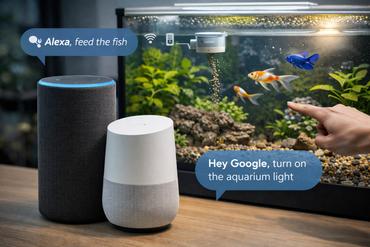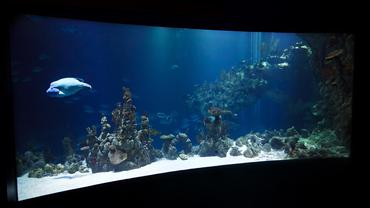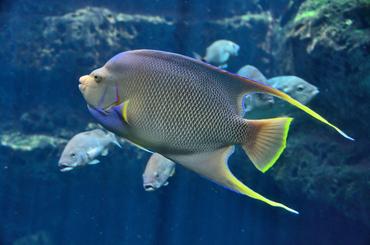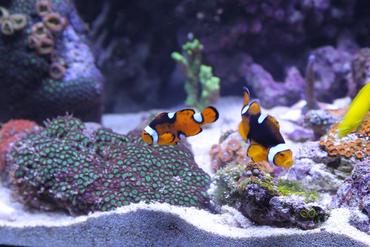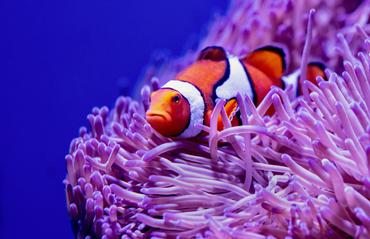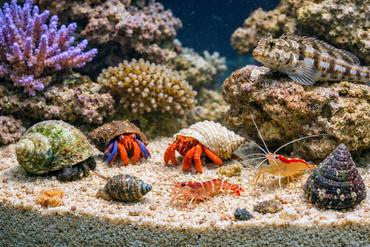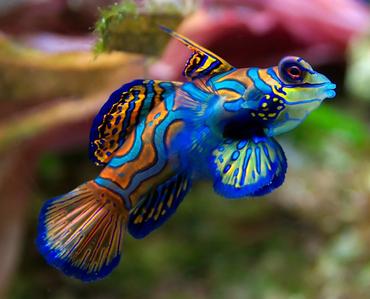COMMON SALTWATER AQUARIUM FISH DISEASES

Updated
No matter how hard you try, you cannot completely protect your fish from falling ill. You can, however, educate yourself on some of the most common saltwater fish diseases so you know how to deal with them.
Perhaps the most frustrating experience you are likely to encounter as an aquarium hobbyist is having the fish in your tank suddenly fall ill. Saltwater aquarium fish diseases can strike quickly and, in some cases, they may even be fatal. No matter how hard you try, you cannot completely prevent your fish from becoming exposed to disease or from falling ill at some point during their lives. What you can do, however, is arm yourself with some basic knowledge about the most common saltwater aquarium fish diseases so you will be able to recognize them when they appear and deal with them appropriately. Swift action on your part as an aquarium hobbyist could mean the difference between life and death for the occupants of your tank.
Marine White Spot Disease
Also known as Marine Ich, Marine White Spot Disease is caused by the parasite Cryptocaryon irritans. This disease typically manifests in the form of small white spots covering the body, fins and gills of saltwater aquarium fish. Marine Ich is very similar to freshwater Ich but it is caused by a different parasite. Both diseases are very contagious and tend to have a greater impact on fish that are already stressed or injured. In addition to the presence of white spots, other symptoms of marine Ich may include ragged fins, pale gills, cloudy eyes, increased mucus production, lethargy and flashing. While freshwater Ich is often treated by increasing the tank temperature to speed up the life cycle of the parasite, this treatment may not be effective for marine Ich. Rather, copper treatment is recommended, often in a dosage of 0.15 to 0.24 mg/liter. Increasing the salinity of the tank may also help to kill the parasite.
Marine Velvet
Marine velvet, or simply velvet, is one of the most common saltwater aquarium fish diseases and it has the capacity to spread quickly if not promptly treated. This disease is caused by a dinoflagellate (a single-celled organism) called Amyloodinium ocellatum which is naturally present in many aquariums. This microscopic organism is incredibly hardy which is what makes it so difficult to control and it often acts as a parasite. Infected fish are likely to exhibit a variety of different symptoms including inflammation or bleeding of the gills, destruction of lung tissue, general signs of irritation or stress, difficulty breathing and lethargy. As the disease progresses, the gills and lung tissue will become more damaged and the fish may eventually lose the ability to transport oxygen across the gill membranes – in many cases, this results in the fish suffocating despite the presence of oxygen in the tank. This disease has a high mortality rate if not treated quickly so, upon the first sign of illness, it is important to begin a treatment regimen with copper. Because copper can be toxic for fish at high concentrations, it is extremely important that you follow the dosage instructions carefully.
Fin Rot
Fin rot is generally a bacterial infection brought about by poor water conditions or physical abuse by tank mates. In cases involving aggressive tank mates or fin-nipping behavior, fin rot is a fairly common secondary infection. The most common symptoms of this disease include reddening or fraying of the fins – in extreme cases, the infection may lead to total destruction of the fin. The key to treating this disease is to halt its progression before the fins are totally destroyed. Remove any affected fish to a quarantine tank and begin treatment with an anti-bacterial medication. Performing frequent water changes to improve water quality in the tank is also an essential element in the treatment of this disease and, in some cases, a salt bath may also be effective.
Lateral Line Erosion
This disease is also known by the name Hole in the Head Disease because it typically presents in the formation of pits on the head of infected fish. The cause of this disease is largely debated but it has been linked to nutritional deficiency and poor water quality. Fish suffering from this disease often exhibit a deficiency in Vitamin C, Vitamin D, phosphorus and calcium – lack of water changes resulting in decreased water quality may also contribute to the development of this disease. If the disease is allowed to progress untreated, the damage is likely to spread from the head along the lateral line – hence the name Lateral Line Erosion. This disease is commonly treated with frequent water changes and dietary supplementation. Treating live and frozen foods with vitamin supplements, choosing enriched flake foods and offering fresh vegetables are several ways to supplement the diets of infected fish. Increasing the frequency of water changes is also incredibly important because it will improve the water quality in your tank and make it a healthy environment in which your fish can recover.
Lymphocystis
Lymphocystis is also known as “cauliflower disease” due to the formation of white, cauliflower-like bumps that appear on the bodies of infected fish. This disease is caused by a virus and it is especially common in tanks where fish are already stressed due to poor water quality. The disease typically manifests in the form of small white growths on the fins and skin which often results in a misdiagnosis because this symptom may also be associated with marine Ich. As the disease progresses, however, the growths may spread and join together to form larger, cauliflower-like growths that cover large areas on the skin, fins and sometimes the gills of infected fish. This disease can be very infectious and, unfortunately, there is no known cure. Removing the infected fish to a quarantine tank may help to prevent the spread of the disease but the infected fish may never recover. If the progression of the disease becomes severe, you may want to consider euthanizing the fish to spare it from further suffering.
Vibriosis
Vibriosis is a type of internal infection caused by a genus of gram-negative bacteria called Vibrio. This disease is commonly contracted through contact with open sores or dead fish and, once a fish is infected, the disease tends to progress quickly. Because it is largely an internal infection, many fish suffering from the disease do not show any external symptoms until the final stages of the disease. Some external symptoms associated with this disease include red streaks on the body (an indication of internal hemorrhaging), red spots, dark swollen lesions and cloudy eyes. Behavioral changes may also recur as a result of this disease – some of these changes might include lethargy, loss of appetite and difficulty breathing. The most effective treatment for this disease is oral antibiotics such as kanamycin – this type of treatment is best administered in a quarantine environment because anti-bacterial medications could damage the biological filter in your tank. Though instances are rare, you should also be aware that vibriosis can be transmitted to humans through the handling of infected fish. When handling and treating infected fish, avoid contact between contaminated tank water and any open cuts or sores.
Tuberculosis
Also called “wasting disease,” tuberculosis is more common in marine species than in freshwater tropical fish. This disease often manifest in the form of fin erosion, ulceration on the body, loss of appetite, reddening of the skin and lethargy. If diagnosed early, this disease can sometimes be treated with anti-bacterial medications but these treatments may not be effective in severe cases. For the best chances of success in treatment it is important to quaratine infected fish -- this may also help to prevent the disease from spreading to other tank inhabitants. Poor tank conditions such as overcrowding and poor water quality can greatly increase the risk for this disease. Like vibriosis, tuberculosis is another aquarium fish disease that can be passed to humans through contact with open wounds or sores. For this reason it is important that you exercise caution when handling and treating infected fish.
Tips for Prevention
The key to preventing saltwater aquarium fish disease is to keep your tank as clean as possible. The best way to do this is to keep up with your routine water changes and to replace your filter media on a regular basis. You should also be careful to avoid over-feeding your fish because any uneaten fish food will simply sink to the bottom of the tank and accumulate as organic debris which could have a negative effect on the water quality in your tank. As detritus like uneaten fish food and solid waste accumulates, the ammonia and nitrate levels in your tank are likely to rise which may also cause an increase in the stress levels of your fish. As you probably know, when your fish are stressed they are more susceptible to disease so keeping your fish happy is very important for keeping them healthy.
While you cannot completely protect your saltwater aquarium fish from coming into contact with disease or from falling ill at some point in their lives, you can do them the favor of equipping yourself with some basic knowledge. The more you know about common aquarium fish diseases, the more likely you are to recognized symptoms at the onset and to be able to start a treatment regimen in a timely manner. The sooner you begin treatment, the greater the chances are of your fish making a full recovery. Remember, the lives of your aquarium fish are in your hands and it is your responsibility to care for them to the best of your ability.
MOST RECENT ARTICLES
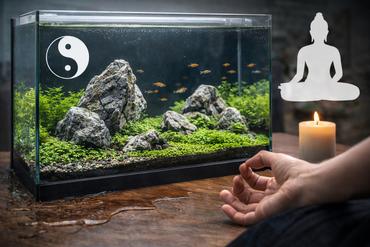
In the modern world, the constant noise of digital notifications and the fast-paced demands of daily life often leave us searching for a sanctuary where we can reclaim a sense of peace.
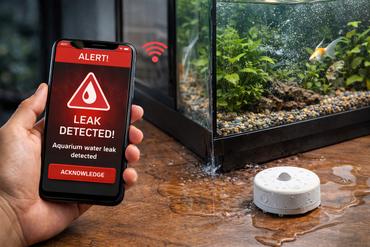
There is no sound more terrifying to an aquarium hobbyist than the slow, steady drip of water hitting a hardwood floor in the middle of the night.



